Australia-Israel relations have hit a low point. Behind the scenes, it's business as usual
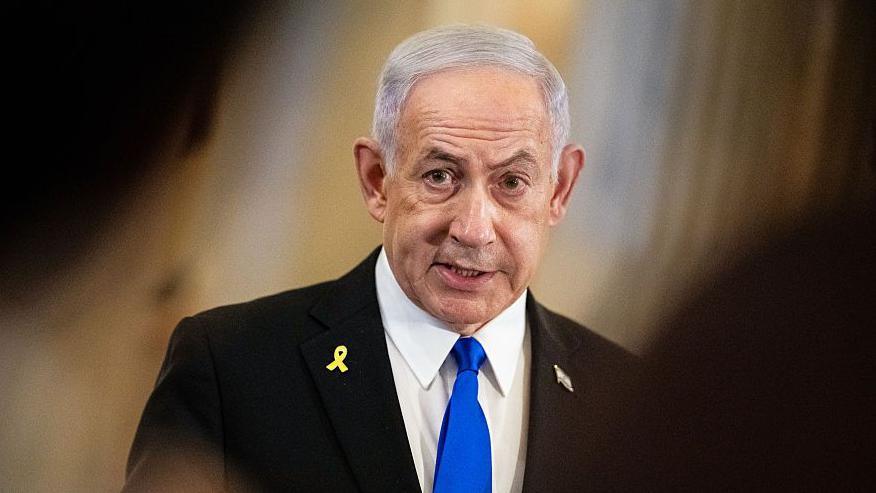
Benjamin Netanyahu's rhetoric towards Australia has turned increasingly bitter in recent weeks
- Published
Tens of thousands of protesters, in capital cities across Australia, took to the streets on 24 August to advocate for Palestinians, condemn the Israeli government for their actions in Gaza, and urge their own government to respond more strongly to the devastation unfolding there.
They were reinforcing pressure that had been well-established weeks earlier, on 3 August, when a colossal gathering marched across Sydney Harbour Bridge in one of the largest political demonstrations ever held in Australia.
A lot had changed since then, diplomatically speaking. Between them, the protests bookended a month in which Australia-Israel relations nosedived to an all-time low – a spectacular falling out that has seen officials' visas cancelled, vitriol spouted in both directions, and claims and denials of Israeli "intervention" in Australia's political affairs following the expulsion of Iran's ambassador.
Many demonstrators on 24 August, however, were still calling for the same things – sanctions against Israel; the end of a "two-way arms trade" that sees Australia supplying parts used in Israeli Defense Forces (IDF) weaponry.
And while Australia-Israel relations appear to have shifted in recent weeks – "It really is quite a change," one expert told the BBC - exactly how much is a subject of debate.
How we got here
This week, the world's leading association of genocide scholars declared that Israel is committing genocide in Gaza, as per the legal definition laid out in the UN convention.
The report by the International Association of Genocide Scholars noted the widespread attacks on both the personnel and facilities needed for survival - including in the healthcare, aid, and educational sectors - as well as the 50,000 children killed or injured by Israel.
Israel said the report was based on "Hamas lies", and has consistently denied carrying out genocide in Gaza.
This comes as the IDF expands its operation – launching a massive assault on Gaza City despite widespread international and domestic opposition – and the primary UN-backed global hunger monitor confirms a famine in the territory.
More than half a million people are facing "catastrophic" conditions characterised by "starvation, destitution and death", the monitor said last week, noting that the situation is "entirely man-made", with aid organisations accusing Israel of the "systematic obstruction" of food entering the Gaza Strip.
Such developments, coupled with growing public outrage, seem to have precipitated a change of tone from the Australian government.
Days after the Sydney Harbour Bridge march, Prime Minister Anthony Albanese followed the UK, France and Canada in announcing that Australia would conditionally recognise a Palestinian state.
Albanese later told the Australian Broadcasting Corporation (ABC) that the decision was partly motivated by a phone call with Netanyahu that made it clear the Israeli prime minister was "in denial" about the situation in Gaza.
In Australia, the move drew backlash from both pro-Israel and pro-Palestinian groups.
Amal Naser, a third-generation Palestinian refugee, called it a "distraction".
"We need much more from the Australian government for them to satisfy their obligations under international law," Ms Naser, an organiser with the Palestine Action Group (not affiliated with the UK-based group Palestine Action) which arranged the protests on 3 and 24 August, told the BBC following Albanese's pledge to recognise Palestine.
She described the Australian government's overall response as "nowhere near proportionate to the situation at hand".
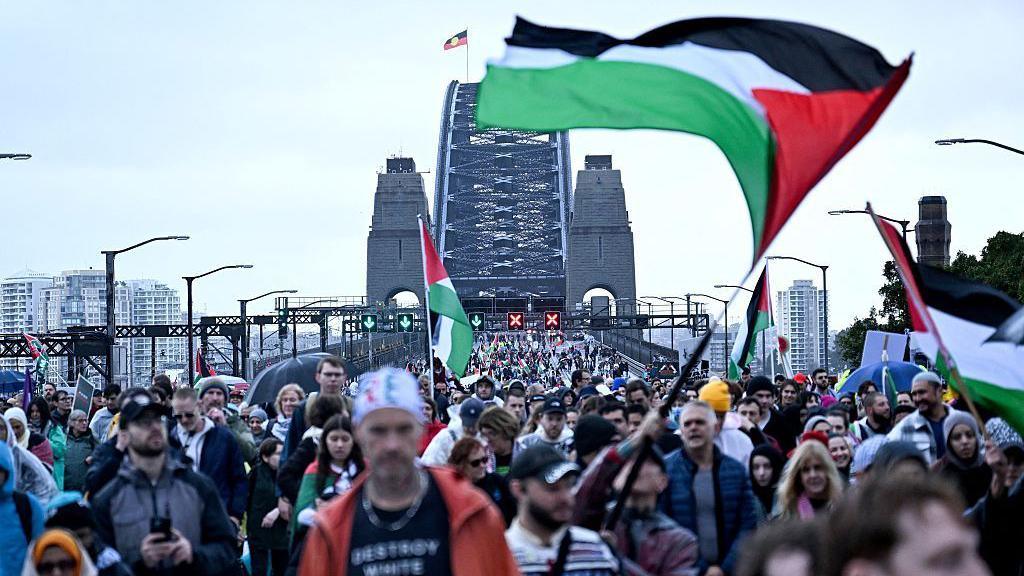
A pro-Palestinian rally across the Sydney Harbour Bridge last month became one of the largest political demonstrations ever held in Australia
"I don't object to [their pledge to recognise a Palestinian state], but I don't support it either," she said. "The Australian government have not taken any material measures to comply with our international law obligations."
Alex Ryvchin, co-chief executive officer of the Executive Council of Australian Jewry, similarly said that he was "bitterly disappointed" by Albanese's announcement – though for different reasons.
"After the announcements by the British, the Canadians and the French, we thought it was pretty imminent. But it still came as a body blow to the community," he said, characterising the move as "gesture politics that really undermines the actual cause of peace on the ground".
"From all my conversations with ordinary members of the [Jewish] community, up and down the country... there's a great frustration with the government," he added. "It's clearly a low point in nearly 80 years of diplomatic relations between the countries."
Perhaps the strongest response, however, came from Netanyahu himself.
On 18 August, the Israeli prime minister wrote a letter to Albanese in which he accused him of pouring "fuel on this antisemitic fire" and described Australia's planned recognition of Palestine as "appeasement" towards Hamas.
The comments echoed earlier rebukes levelled at the UK, France and Canada, whom Netanyahu accused of siding with "mass murderers, rapists, baby killers and kidnappers" in their calls for Palestinian statehood.
But in Australia's case, things went further.
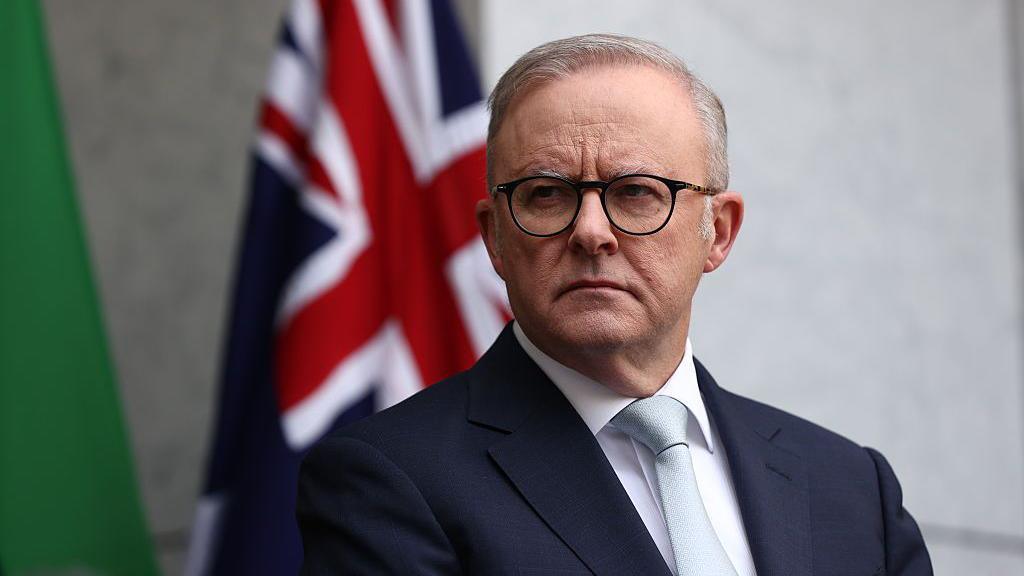
Australian prime minister Anthony Albanese angered Israel when he pledged to recognise Palestinian statehood
The same day that news broke of Netanyahu's letter to Albanese, Australia's home affairs minister, Tony Burke, confirmed that far-right Israeli politician Simcha Rothman – a member of Netanyahu's coalition – had been denied entry into Australia ahead of an upcoming "solidarity tour".
Israel in turn revoked the visas of Australian representatives to the Palestinian Authority, the internationally-backed governing body of the Palestinians, which is based in the West Bank.
The day after, on 19 August, Netanyahu ramped up his rhetoric against Albanese, describing him as a "weak politician who betrayed Israel and abandoned Australia's Jews". Two days after that, in an interview with Australia's Sky News, he claimed Albanese's record would be "forever tarnished" by the decision to recognise a Palestinian state.
Albanese dismissed Netanyahu's rebukes, telling reporters he does not "take these things personally".
"I treat leaders of other countries with respect, I engage with them in a diplomatic way," he said.
But Burke responded with stronger language, telling the ABC that Netanyahu was "lashing out".
"Strength is not measured by how many people you can blow up or how many people you can leave hungry," he said.
Why now?
The public row has sunk Australia-Israel relations to a nadir.
Ian Parmeter, a research scholar at Australia National University's Centre for Arab and Islamic Studies who spent decades working across Australian government departments, says he's never seen the two countries' relations in a worse state.
As he puts it: "Australia has generally had a very pro-Israel foreign policy."
"This is language I haven't heard from an Australian prime minister talking about Israel in all my time working on foreign policy issues," he told the BBC.
In the aftermath of Hamas's 7 October 2023 attack on Israel, which killed about 1,200 people and saw 251 others taken hostage, Australia remained steadfast in its support of its democratic ally – expressing solidarity, insisting on Israel's right to defend itself and resisting calls to censure it despite mounting civilian death tolls.
In the time since 7 October, almost 62,900 people have been killed in Gaza, according to the Hamas-run health ministry.
Mr Parmeter suggests that Australia's recent change of tack was likely motivated by two major factors: Netanyahu's denial of a humanitarian crisis in Gaza, and his escalation of plans to seize control of the entire territory.
Another, he adds, would have been the Sydney Harbour Bridge march, which "made clear that there was a very strong mood among the Australian people for the government to do something – even if it was symbolic".
What has actually changed?
Pro-Palestinian advocates, however, believe that the Australian government's increasingly frosty approach to Israel is little more than empty symbolism, and the falling out between the two governments merely a diplomatic melodrama that conceals a controversial alliance.
Protesters on 3 and 24 August put forth specific demands of the "something" that they wanted the Australian government to do. But prominent voices within the pro-Palestinian movement note that, behind the scenes, the situation is largely business as usual.
"[We had] one of the largest marches in Australian history, with the clear demand to sanction Israel and end the two-way arms trade," Ms Naser said, echoing calls made by numerous human rights groups including Amnesty International. "I think the Australian government has had to make an urgent move to essentially appease the masses. But they haven't gone far enough."
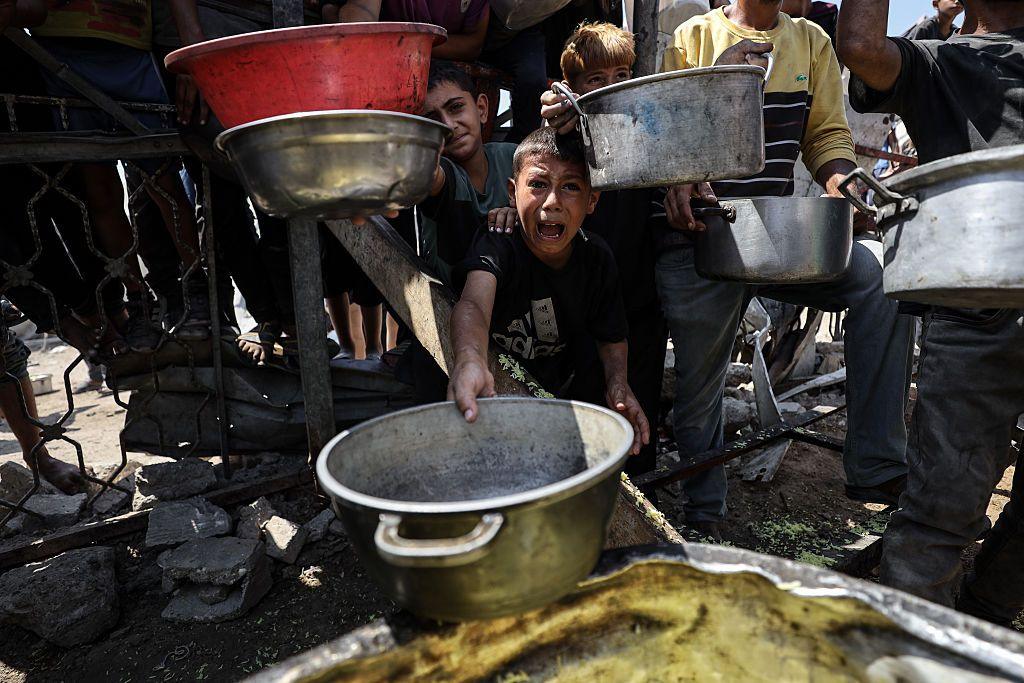
Israel is committing genocide in Gaza, according to the world's leading association of genocide scholars
Australia supplies parts used in Israel's F-35 fighter jets, which Israel has used in operations in Gaza – most notably, the mechanism that opens the aircraft's bomb-bay doors, which is not manufactured by any other country.
The Australian government denies allegations that it supplies arms to Israel, with foreign affairs minister Penny Wong arguing that they only supply "components and parts that are non-lethal in nature" - though by the UN definition this still counts as part of the arms trade.
Against that backdrop, some in the pro-Palestinian camp are questioning the sincerity and efficacy of the Australian government's posturing towards Israel.
Other demands from pro-Palestinian activists include stronger Australian sanctions on Israel - to date, the government has imposed financial and travel sanctions on two far-right Israeli ministers, Itamar Ben-Gvir and Bezalel Smotrich - and the expulsion of Israel's ambassador from Australia.
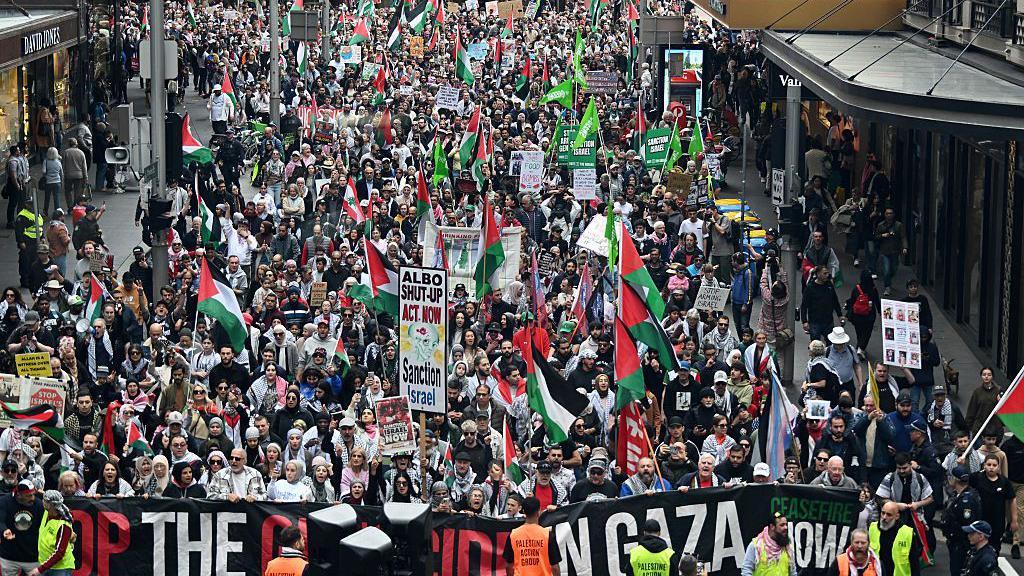
Pro-Palestinian protests have frequently marched through the streets of Australia's capital cities since 7 October 2023
Instead, the Australian government last week took action that Israel applauded: ordering Iran's ambassador to leave the country based on allegations that the Iranian government directed antisemitic attacks in Sydney and Melbourne.
Intelligence services linked Iran to an arson attack on a café in Sydney in October last year, and another on a synagogue in Melbourne in December, Albanese told a press conference. It is the first time Australia has expelled an ambassador since World War Two. Iran has "absolutely rejected" the allegations.
Israel, meanwhile, took credit for the move, with Israeli government spokesperson David Mencer suggesting that it was prompted by Netanyahu's "forthright intervention" and criticisms.
"The relationship between this country and Australia was damaged, and so it's welcome that after Prime Minister Netanyahu's timely intervention that these actions have been taken by Australia's government," Mencer told reporters.
The Australian government has dismissed the suggestion that Israeli interference played a role, with Burke, Australia's home affairs minister, telling the ABC it was "complete nonsense".
The incident highlights the diplomatic tightrope that Australia is struggling to walk.
On the domestic front, discontent about Australia's position towards Israel continues to simmer on both sides - while experts suggest that the diplomatic spat is unlikely to have a lasting impact in either country.
"The actual statistics don't indicate that this is a major relationship for us," Mr Parmeter says. "Does Australia lose much? Not really at this stage.
"I have no doubt that all of this will eventually be healed, because the human ties between Australia and Israel are strong."
Additional reporting by Tiffanie Turnbull